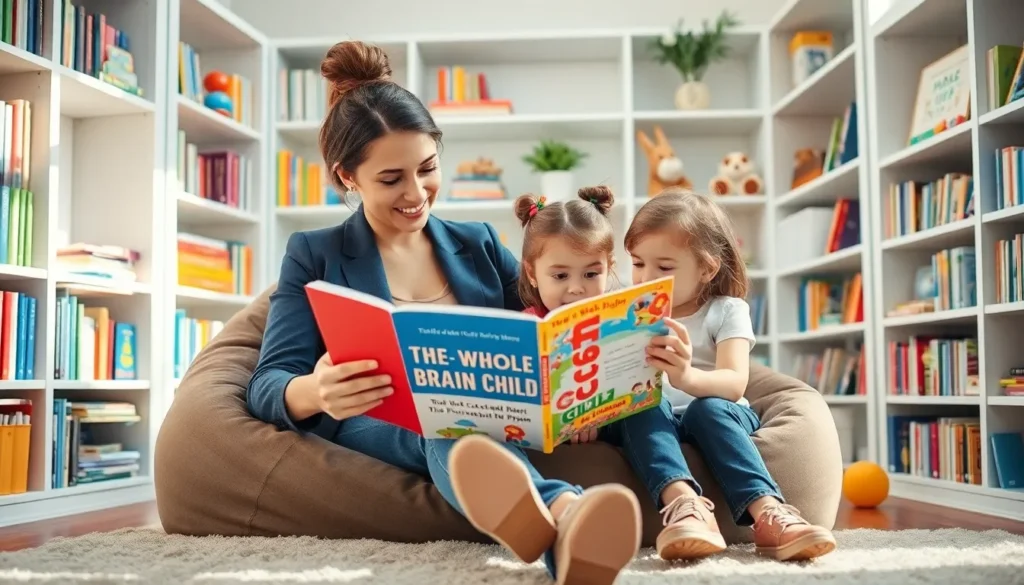In a world where parenting often feels like deciphering an ancient, scroll-like recipe, half of which is missing, child development books emerge as trusty guides. They can help transform you from a caffeine-fueled zombie back into a knowledgeable caregiver better equipped to nurture a little genius. Trust us, those pages packed with insights can bring both joy and a dash of sanity. So, grab a cup of coffee (or tea if you’re fancy), and let’s explore the wonderful world of child development literature.
Table of Contents
ToggleThe Importance of Reading for Child Development

Reading is not just about turning pages: it’s a ticket to a universe overflowing with possibilities. Studies reveal that when children are exposed to literature early on, their vocabulary flowers, comprehension skyrockets, and cognitive skills sharpen. Picture a garden: the more you water it, the more it blooms. Likewise, reading cultivates a rich learning environment.
And it isn’t only about words on a page. Reading together can strengthen bonds between parents and children, fostering emotional intelligence and social skills. Imagine cozying up with a colorful picture book, the cadence of your voice bringing characters to life. Now that’s a bonding experience.
Also, stories stimulate imagination and creativity. Children learn to get lost in worlds far removed from their own, developing empathy and critical thinking. Simply put, the importance of reading in child development cannot be overstated, it’s the fertile soil that allows young minds to flourish.
Key Areas of Child Development Covered in Books
Child development books encompass a treasure trove of essential topics that every caregiver should explore. Understanding these key areas can make all the difference.
- Cognitive Development: This includes how children think, learn, and solve problems. Books investigate into activities that boost critical thinking, encouraging curiosity and imagination.
- Emotional Development: Emotional literacy is crucial. Some books cover ways to help children process feelings and navigate social situations effectively.
- Physical Development: Yes, learning about motor skills is fundamental. Many guides include insights into promoting physical activity through fun and engaging games.
- Social Development: Books often explore healthy relationship building and teamwork, vital for creating socially adept individuals.
- Language Development: Language skills are intricate. Many resources tackle ways to enhance vocabulary and foster effective communication from an early age.
By addressing these areas, educators and parents can arm themselves with the knowledge necessary to nurture well-rounded children.
Top Child Development Books to Consider
When it comes to must-reads, the list is long, but some child development books stand out like shining stars in a night sky. Here are a few top recommendations:
- “The Whole-Brain Child” by Daniel J. Siegel and Tina Payne Bryson: This groundbreaking book focuses on integrating different parts of a child’s brain to promote balanced emotional and intellectual growth.
- “How to Talk So Kids Will Listen & Listen So Kids Will Talk” by Adele Faber and Elaine Mazlish: This classic is packed with strategies to communicate effectively with children, fostering collaboration and respect.
- “Mind in the Making” by Ellen Galinsky: Highlighting seven essential life skills for children, this book emphasizes the importance of creating learning opportunities that promote these abilities.
- “Raising An Emotionally Intelligent Child” by John Gottman: It dives deep into emotional literacy, focusing on how parents can nurture emotion-regulation skills in their kids.
- “NurtureShock” by Po Bronson and Ashley Merryman: Challenging conventional wisdom, this book explores various child development myths and clarifies how children truly learn and grow.
How to Choose the Right Child Development Books
Choosing the right child development books may feel overwhelming, especially with a sea of options available. Here’s a smart strategy to narrow it down:
- Identify Relevant Topics: What specific challenges or interests do you want to address? Focus on books that tackle those areas.
- Consider Age Appropriateness: Different books cater to various age ranges. Ensure the material aligns with the developmental stage you’re interested in.
- Look for Author Credentials: Authors with backgrounds in psychology, education, or child development tend to provide credible, research-backed insights.
- Read Reviews: Hearing from other parents and educators can offer valuable perspectives on a book’s effectiveness. Check out review platforms for genuine feedback.
- Sample Before You Buy: Many online platforms let you look through a few pages. Taking a peek can often give you a better feel for the book’s tone and style.
Incorporating Child Development Books Into Daily Life
Integrating child development books into daily routines is simpler than it seems. Here’s how:
- Set Up a Reading Routine: Designate a time each day for reading, whether it’s bedtime stories or a weekend morning ritual. Routine fosters anticipation.
- Discuss What You Read: Engage children by discussing the stories. Ask questions about their thoughts and feelings about the characters and situations.
- Create a Cozy Reading Space: Transform a corner of your home into a reading nook. A comfortable spot with pillows or a bean bag can make reading enjoyable.
- Combine Books with Activities: If a book covers a specific subject, tie in related activities, like arts and crafts or games, creating hands-on experiences that reinforce the lessons learned.
By seamlessly integrating these books into daily life, parents and caregivers turn education into an exciting, ongoing adventure.



